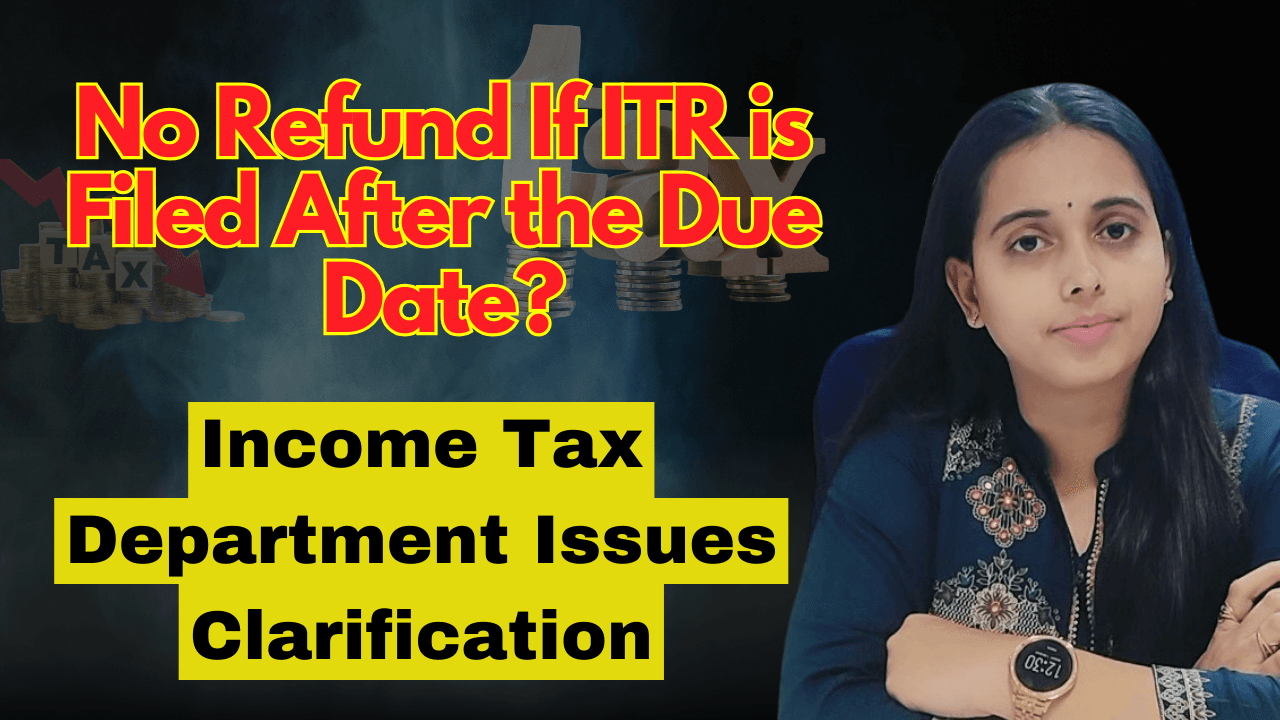No Refund If ITR is Filed After the Due Date
No Refund If ITR is Filed After the Due Date The introduction of the Income Tax Bill 2025 in the Lok Sabha raised concerns among taxpayers about whether they would be eligible for a refund if they filed their Income Tax Return (ITR) after the due date. Several tax experts pointed out that the new bill appeared to impose a restriction on refunds for belated returns. However, the Income Tax Department has now clarified that the refund provisions remain unchanged. Let’s break down the issue and understand what the new bill actually states.
- Understanding the Concern: What Sparked the Confusion?
The confusion arose due to Clause 263(1)(a)(ix) of the Income Tax Bill 2025, which states that a taxpayer must file their ITR within the prescribed due date to claim a refund. No Refund If ITR is Filed After the Due Date This was seen as a major deviation from the current Income Tax Act, 1961, which allows taxpayers to claim refunds even if they file a belated return (before December 31st of the assessment year).
Expert Opinions on the Interpretation
- Vivek Jalan, Partner at Tax Connect Advisory Services LLP, pointed out that under the new bill, refunds can only be claimed if the return is filed within the due date.
- CA Ashish Niraj stated that the bill does not mention belated returns, which implies that refunds would not be allowed if an ITR is filed after the due date.
- CA Bhavesh Jindal No Refund If ITR is Filed After the Due Date called this provision “draconian,” stating that it could cause undue hardship for taxpayers who miss the filing deadline due to genuine reasons.

However, these concerns were put to rest after the Income Tax Department issued an official clarification on the matter.
- IT Department’s Clarification: Refund Rules Remain Unchanged
The Income Tax Department confirmed that there is no change in refund-related provisions under the new bill. Here’s what the department clarified:
- Refunds can still be claimed even if the ITR is filed after the due date (before December 31st of the assessment year).
- Section 263(1)(ix) of the bill simply incorporates the existing provision that refunds are processed under Section 271(1)(e), similar to the current law.
- Taxpayers who file their ITR after the due date but before December 31st will not lose their refund eligibility.
- If an ITR is filed after December 31st, the only way to claim a refund is through a condonation request under Section 119(2)(b).
- What Are the Current Provisions for Claiming Refunds?
Under the Income Tax Act, 1961, taxpayers can claim refunds in the following ways:
- Section 237 states that if a taxpayer has paid excess tax, they are entitled to a refund.
- Section 139(1) allows a taxpayer to file a normal return before the due date (July 31st for individuals).
- Section 139(4) permits taxpayers to file a belated return up to December 31st of the assessment year.
- Under the new bill, the same provisions apply, meaning belated returns are still eligible for refunds.
- What Happens If You File Your ITR After December 31st?
While the Income Tax Department has confirmed that refunds will be processed for belated returns, taxpayers who fail to file their return by December 31st will have only one option left:
https://www.incometax.gov.in/iec/foportal/
Filing a Condonation Request (Section 119(2)(b))
- No Refund If ITR is Filed After the Due Date If you miss the belated return deadline (December 31st), you cannot claim a refund through regular ITR filing.
- You will need to submit a condonation request under Section 119(2)(b) to the Principal Commissioner of Income Tax (PCIT) or Commissioner of Income Tax (CIT).
- This request must be physically submitted and will be processed on a case-to-case basis.
- You must provide a valid reason for missing the deadline.
- Approval is at the discretion of the tax authorities.
Implications of Late Filing
- Penalty under Section 234F: Late filing attracts a penalty of ₹5,000. However, if your income is below ₹5 lakh, the penalty is ₹1,000.
- Loss Carryforward Restrictions: If you file a belated return, you cannot carry forward losses under business/professional income.
- Summary: Key Takeaways for Taxpayers
✅ You can claim a refund even if you file your ITR after the due date (before December 31st).
✅ The new Income Tax Bill 2025 does not change refund rules; the provisions remain the same.
✅ If you miss the December 31st deadline, you must file a condonation request under Section 119(2)(b) to claim a refund.
✅ Belated returns will still be eligible for refunds, as confirmed by the IT Department.
✅ Filing on time is still advisable to avoid penalties and restrictions on carrying forward losses.
- Conclusion: Should You Worry About Refunds Under the New Bill?
The initial concerns about refunds being denied for belated returns were based on a misinterpretation of the bill’s language. The Income Tax Department has now clarified that refund provisions remain unchanged, and taxpayers can still claim refunds even if they file a belated return by December 31st.
However, it is always advisable to file your ITR before the due date to avoid penalties and ensure smooth processing of your refund. No Refund If ITR is Filed After the Due Date If you miss the belated return deadline, you can still claim a refund by filing a condonation request under Section 119(2)(b), but this process is more complicated and at the discretion of the tax authorities.
To stay compliant and avoid last-minute stress, it is recommended to file your ITR on time and keep track of tax deadlines.
Stay Updated!
For the latest updates on taxation, GST, compliance, and financial planning, keep following Taxgyany for expert insights and simplified explanations.
For More Information : https://taxgyany.com/

